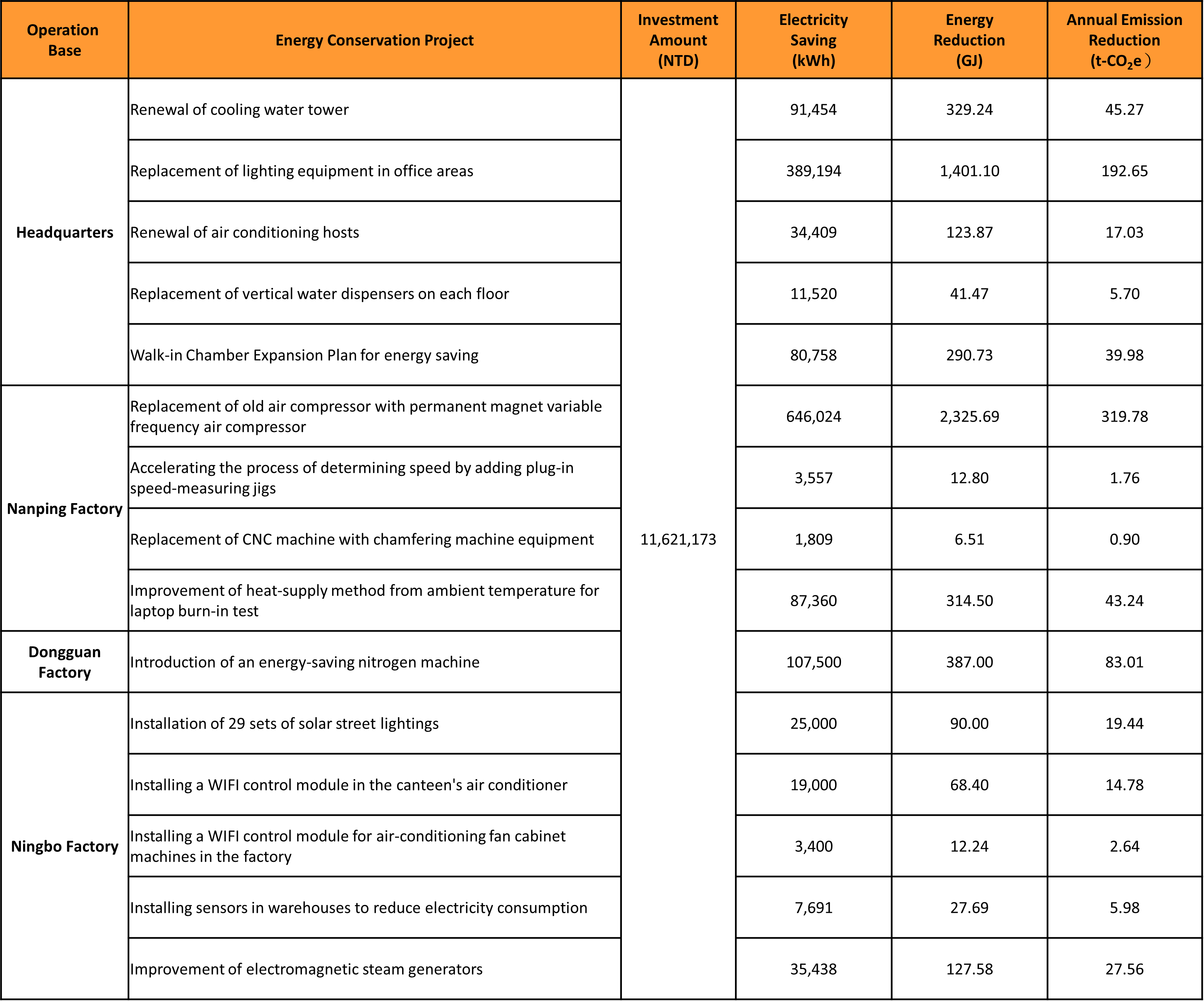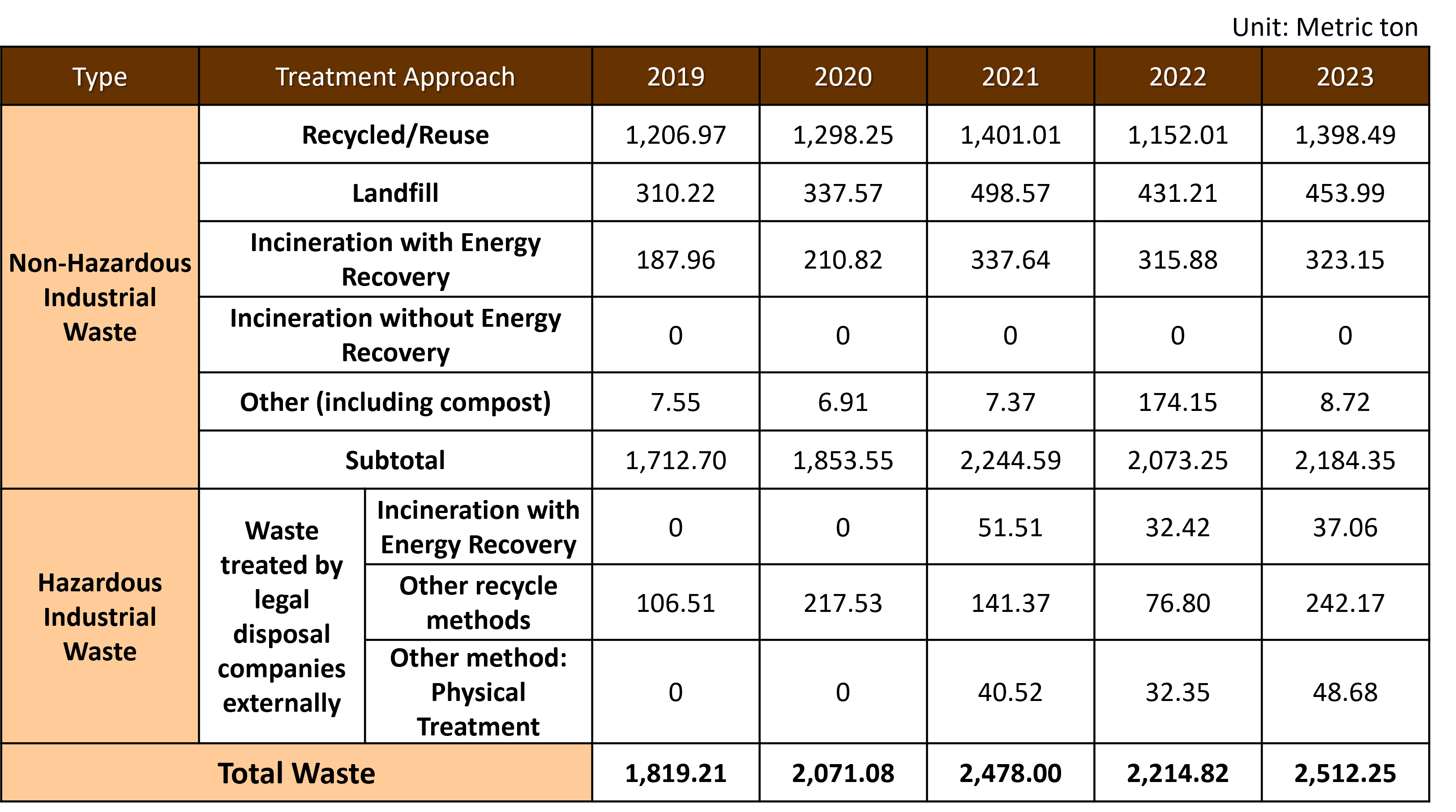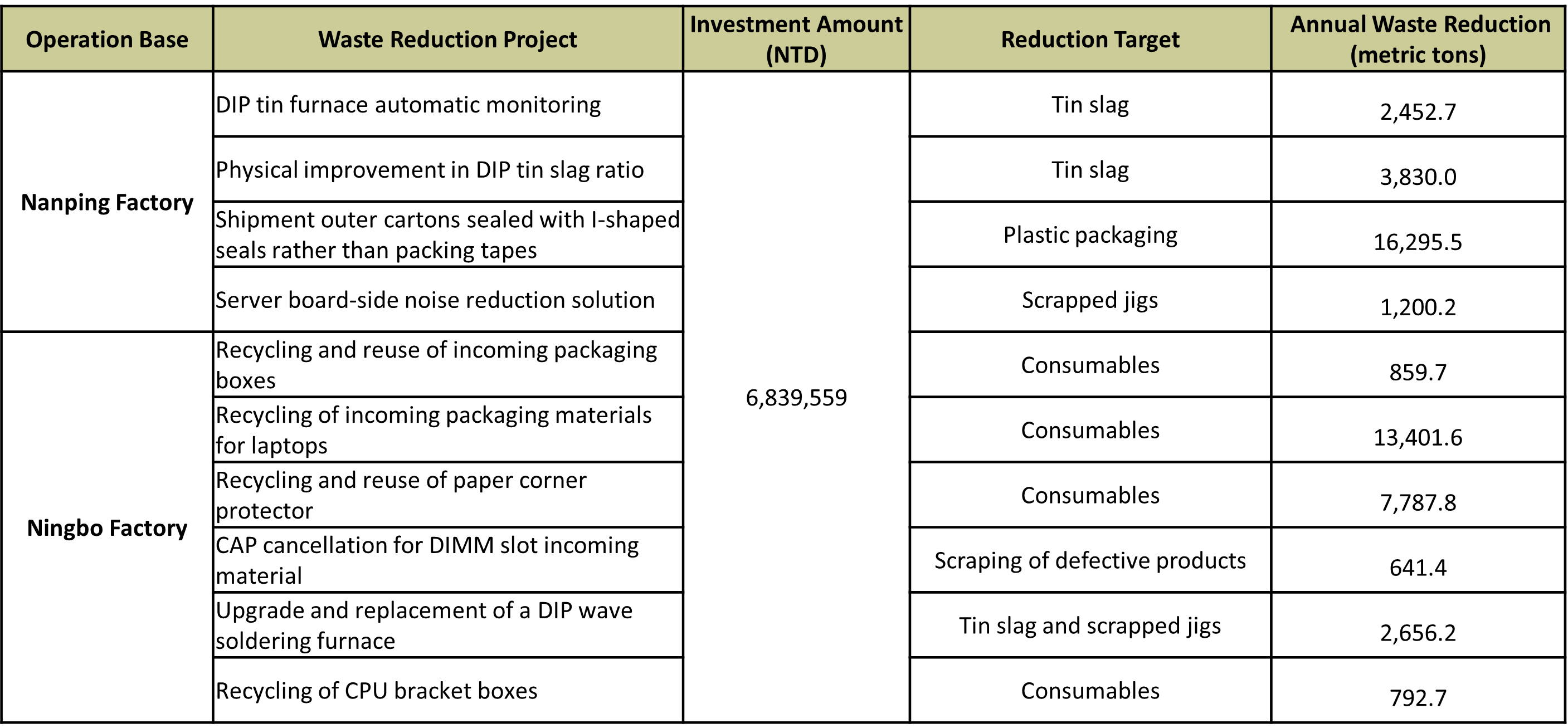Since the launch of the Green Action Plan in 2009, GIGABYTE has been devoted to building employeesʼ environmental awareness in their work and life through a comprehensive and pragmatic approach. Environmental protection and sustainability should not be lofty topics but rather a kind of habit practiced every day. As for environmental performace management, GIGABYTE plans a clear long-term goal and adopts active reduction measures based on a short-term target, “333 Reduction”, aiming to reduce carbon, water, and waste by 3% per year.
The environmental performances are disclosed as below. For emissions and energy-related performance, the data boundary covers GIGABYTEʼs operation headquarters (including subsidiary Giga Computing), Taoyuan Nanping Factory, Dongguan and Ningbo Factories in mainland China, as well as the Taipei Silicon Valley Park Offices, where GIGABYTEʼs subsidiaries G-Style, Bestyield International, Selita Precision, and sub-subsidiary GIGAIPC are located. This coverage accounts for approximately 99.86% of the Groupʼs consolidated revenue in 2023. For water and waste performance, the data boundary covers GIGABYTEʼs headquarters building, Taoyuan Nanping Factory, Dongguan and Ningbo Factories in mainland China. The revenue from these sites in 2023 accounted for 63.84% of the Groupʼs consolidated revenue.
Performance of Environmental Management Target
Progress Tracker of Long-term Reduction Targets
Reduce carbon emissions by 50% in 2025 compared to2009
Reduce water use by 20% in 2030 compared to 2010
Reduce waste generation by 50% in 2030 compared to 2010
Progress Tracker of 333 Reduction Plan Targets
Reduction Performance of GHG Emissions, Water, and Waste in 2023
GIGABYTE has undergone organizational strategic transformation and product portfolio diversification in response to the popularization of cloud computing, industrial digitization, and processing automation in the post-epidemic era. We also partner with global partners to provide innovative solutions in manufacturing, medical, transportation, communications, etc. However, these efforts may also result in drastic changes in our annual production and resource consumption.
Performance of Environmental Resource Management
Energy Conservation
Electricity is the primary type of energy used by GIGABYTE in our routine operations and production processes. Since it is the major source of GIGABYTE’s greenhouse gas emissions, we conduct careful data collection, inventories, and quality assurances carried out by a third party in accordance with ISO14064-1 Standards every year. Total electricity consumption in 2023 was 41,410.43 MWh, an increase of 0.85% compared to 2022 and 20.34% lower than 2009. Analysis of increase in electricity consumption found that this was due to the increased production of AI servers and more energy-intensive production processes in recent years. Total energy consumption in 2023 from electricity and other sources amounted to 154,311.42 GJ, a decrease of 40.54% compared to the base year of 2009. The intensity of total energy consumption per 1,000 pieces of production in 2023 was 15.55 GJ and per capita was 26.15 GJ.
Electricity Consumption
2023 Energy Conservation and Emission Reduction Projects

[Note 1] The energy types of all energy conservation measures were electricity. The figures are estimated.
[Note 2] The measures are different year by year. The estimated electricity savings were compared to the energy consumption of the equipment before improvement.
[Note 3] The reduced emissions in Taiwan bases were calculated based on the 2022 electricity emission factor, 0.495 kg-CO2e/kWh, announced by the Bureau of Energy, MOEA.
[Note 4] Emission reduction at China Dongguan Factory was calculated based on the emission factor of 0.7722 (kg-CO2e/kWh) in southern China; as for the China Ningbo Factory, the emission factor of 0.7777 (kg-CO2e) for eastern China was used. The investment amount in RMB is converted into NTD at the exchange rate of 4.4.
Water Resource Conservation
The manufacturing process of GIGABYTEʼs products is mainly assembly, which only consumes a little water, and the water sources for basic factory facilities and domestic water are tap water. The water resources management policies are promoted and implemented through water-saving policies, education promotion, and annual performance reporting. In addition, the G-HOME Sustainable Eco-Roof at the Headquarters is equipped with rainwater recycling systems that can supply about half the water for irrigation each year. Both Dongguan Factory and Ningbo Factory in China have established water recycling systems for their air-conditioning and manufacturing facilities. In the future, we will continue to look for raw materials with lower water footprints to achieve the water-saving target of the overall product lifecycle.
Water Withdrawal and Discharge
Regarding wastewater discharge, all of GIGABYTEʼs wastewater is domestic sewage and is legally discharged into underground sewers in compliance with local laws and regulations. Thus, it has not caused impacts on the environment and ecology around the business locations.
2023 Water Conservation Projects

Waste Reduction and Pollution Control
The domestic waste, recyclable waste, and hazardous industrial waste generated by each GIGABYTEʼs operating base are entrusted to local qualified manufacturers for disposal. In accordance with local waste disposal regulations, the manufacturer clears and transports waste off-site for disposal, and provides a proper disposal receipt for the companyʼs declaration and management of disposal. Audits are also conducted regularly at waste disposal manufacturers to ensure proper waste disposal. We strive to reduce waste by improving the process and introducing circular resource modes. Our ultimate goal is to achieve “Zero Waste and Zero Pollution”. The increase in waste in 2023 was primarily caused by Ningbo Factory scrapping a large quantity of fixtures and equipment.
Waste
[Note] Rounding of the data may lead to the sum of data being different between this table and the below table.

2023 Waste Reduction Projects

VOCs Management
Volatile Organic Compounds (VOCs) can easily react with other pollutants in the lower atmosphere, such as photochemical reactions with nitrogen oxides (NOx) to form ozone or smog, one of the main causes of poor air quality. GIGABYTEʼs air pollution control complies with Taiwan and mainland China regulations and standards. Taoyuan Nanping plant is not subject to Taiwanʼs “Air Pollution Control Act” at present. Dongguan and Ningbo Factories have been inspecting VOCs every year since 2020 in order to properly solve the problem of xylene and non-methane total hydrocarbon emissions. The emissions comply with local regulations and standards.
VOCs Emissions
[Note] Before 2020, only China Dongguan Factory inspected VOCs emissions.
Sustainability and Environmental Education Promotion
Over the past decade, the Green Action Plan has delivered a variety of services: knowledge-oriented activities such as seminars, workshops, and newcomer training; experience-oriented activities such as working holidays, a green volunteering club, drawing and photography contests; custom-oriented measures like vegetarian food promotion, waste reduction – which have effectively promoted employees to develop more sustainable lifestyles and cultivate their environmental protection concepts; call on suppliers of “Reduction. Sharing. Love the Earth” Alliance to join the “333 Reduction Plan” and environmental protection activities to guard the planet together.
For further details, please refer to Sustainability and Environmental Education.
For further details, please refer to Tetralogy of Supply Chain Engagement.
Besides the internal environmental education, the G-HOME GIGABYTE Sustainable Eco-Roof, founded in 2013, also promotes the benefits of rooftop greening by opening it to external visitors. Between 2017 and 2022, G-HOME received the Environmental Education Facility and Field Certification from the Environmental Protection Administration. The two certificated environmental education courses. Rooftop Greening is not A Dream and The World is a Circle, are developed to promote the concepts of sustainability, co-prosperity, and zero waste to the public, industries, government, and academia. Moreover, we look forward to seeing more sustainable eco-roofs being constructed to make Taiwan greener and healthier.
Sustainability and Environmental Education Hours in the Most Recent 5 Years
- Home
- Innovation Management
- The Guanxi Blue Zone
- The Ocean is Our Home
- From the Chairman
- Commitment to CSR
- Stakeholder Engagement
- Material Topics
- SDGs
- Corporate Organization
- Code of Conduct
- Information Security & Privacy
- Risk Management
- Supply Chain Management
- Tetralogy of Supply Chain Engagement
- Conflict Mineral
- Environmental Management Policy
- Climate Action
- Eco-friendly Product
- Extended Product Responsibility
- Circular Economy
- Green Action
- Sustainability/Environmental Education
- Green Activities
- Working Holiday
- Corporate Volunteering
- Go Green Taiwan
- Make Earth Green Again
- Tree Map
- Overview/Core Concept
- Rooftop Farm
- Ecology Photo Competition
- Sustainability-related Certification
- Human Resource Structure
- Talent Management
- Human Rights Management
- Talent Cultivation and Development
- Occupational Safety
- Health Care
- Upgrade Your Life
- Social Inclusion
- CSR Milestone
- Economic Aspect
- Environmental Aspect
- Social Aspect
- CSR Report
